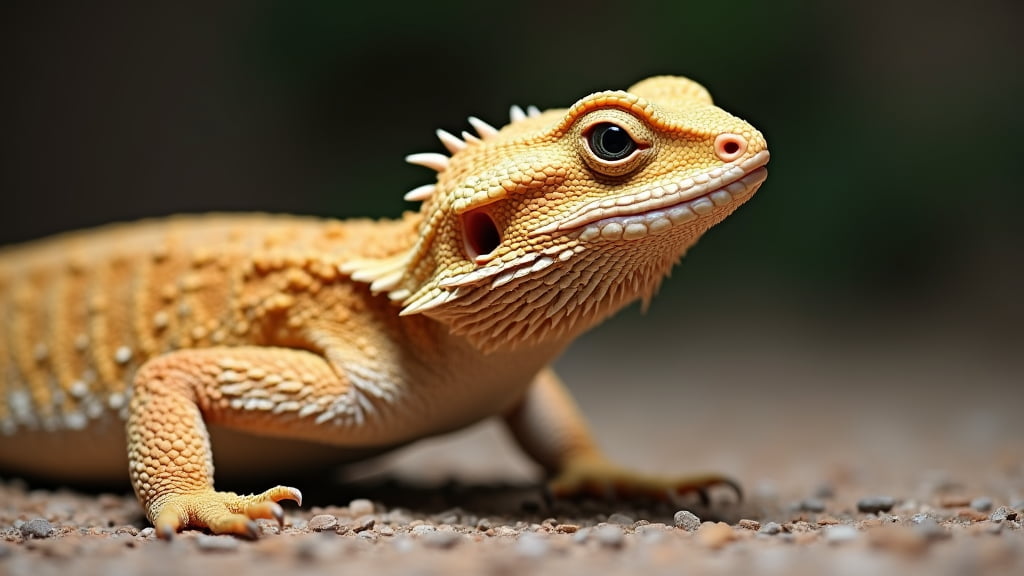Bearded dragons are fascinating reptiles that make for engaging and relatively low-maintenance pets. As an avid reptile enthusiast with years of experience, I’ve learned that the key to keeping these marvellous creatures happy and healthy lies in regular health checks. In this guide, we’ll walk through the essential aspects of bearded dragon health check-ups, ensuring your scaly friend remains in peak condition.
Routine Health Checks
Regular health inspections play a crucial role in identifying potential health issues early.
Physical Examination
Conducting a thorough physical examination of your bearded dragon is the first step to ensuring its well-being.
Eyes and Nose
A healthy bearded dragon should have bright, clear eyes with no signs of discharge. Their noses should also be free from any mucus or crust. My beardie, Sparky, once developed a small nasal discharge, which was an early sign of a respiratory infection. Thankfully, I caught it in time and consulted a vet who prescribed the necessary treatment.
- Look out for: Cloudy eyes, discharge, or swelling.
- Action: Seek veterinary advice if you notice any abnormalities.
Skin and Scales
Inspect your dragon’s skin for any unusual shedding, retained shed, or parasites. Bearded dragons shed their skin periodically, and it’s essential for the old skin to come off entirely.
- Look out for: Discolouration, wounds, or stuck shed.
- Action: Soak your dragon in warm water to help with shedding and consult a vet if the issue persists.
Behavioural Monitoring
A change in behaviour can often be a red flag for health problems.
Activity Levels
Healthy bearded dragons are active and curious. If your pet suddenly becomes lethargic or refuses to move, it could be indicative of an underlying issue.
Appetite
Bearded dragons typically have a robust appetite. A significant decrease in eating or drinking habits might suggest illness or stress. My younger dragon, Blaze, once stopped eating due to stress from a habitat change. Adjusting the environment and reducing handling helped him bounce back.
Nutritional Care
Proper diet is integral to your bearded dragon’s health.
Balanced Diet
A mix of vegetables, live insects, and occasional fruits is essential for a balanced diet.
- Vegetables: Collard greens, dandelion greens, and butternut squash.
- Insects: Dubia roaches, crickets, and mealworms (in moderation).
Supplements
Calcium and vitamin supplements can prevent metabolic bone disease, a common ailment in captive bearded dragons.
- Calcium Powder: Dust insects with calcium powder at least twice a week.
- Supplementation Schedule: Stick to a consistent schedule to ensure your dragon receives the necessary nutrients.
Environmental Setup
A well-maintained environment is critical for your bearded dragon’s health.
Enclosure and Habitat
An appropriately sized enclosure with proper temperature gradients and UV lighting mimics their natural habitat.
- Temperature: Basking area should be around 40-43°C, and the cool side between 23-26°C.
- UV Lighting: Full-spectrum UVB lighting is crucial, as it helps with calcium absorption. Replace the UVB bulb every six months.
Substrate
The type of substrate used in the enclosure can influence your dragon’s health. Avoid loose substrates like sand which can cause impaction if ingested.
- Recommended Substrates: Reptile carpets, non-adhesive shelf liner, or ceramic tiles are safer alternatives.
When to Seek Veterinary Care
Even with meticulous care, health issues can arise. Knowing when to consult a veterinarian is vital.
Signs of Illness
Be vigilant for signs that indicate health problems.
Common Symptoms
- Weight Loss: Unexplained weight loss could signify internal issues.
- Mouth Rot: Discoloured tissue around the mouth, often coupled with a refusal to eat.
- Bloated Abdomen: Could indicate impaction or internal parasites.
Regular Check-Ups
Annual veterinary exams can help detect and prevent potential issues. Consult a reptile specialist who understands the unique care needs of bearded dragons.
Conclusion
Routine health checks, proper nutrition, and a suitable environment are the pillars of bearded dragon health. By being observant and proactive, you can ensure your bearded dragon leads a vibrant and healthy life. For any concerns or specific health issues, always consult a qualified reptile veterinarian. For more information, visit our detailed guide on bearded dragon health.
Meta Description
“Ensure your bearded dragon’s health with our comprehensive health check guide. Learn about physical exams, diet, environment, and when to consult a vet. Keep your scaly friend thriving!”
For detailed information on proper bearded dragon nutrition, visit Our Bearded Dragon Nutrition Guide and for tips on habitat setup, check out Creating the Perfect Bearded Dragon Enclosure.
By following this guide, you can provide your bearded dragon with the best care, ensuring they lead a long and happy life. If you have any experiences or tips, feel free to share them in the comments below!

